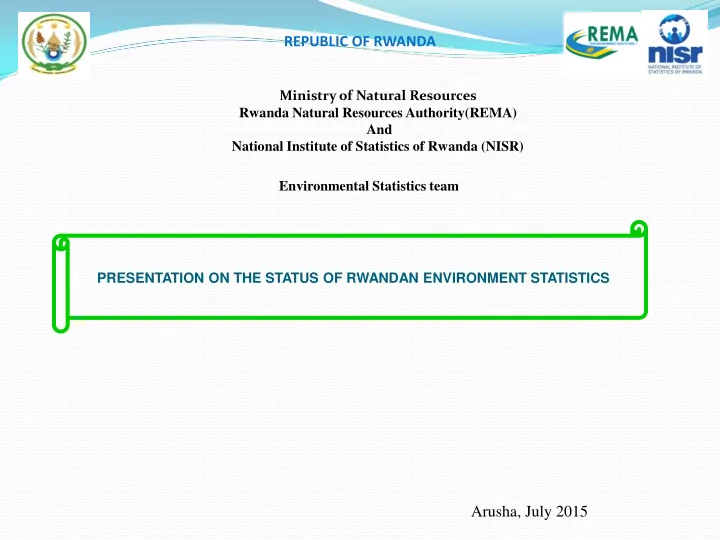

REPUBLIC OF RWANDA Ministry of Natural Resources Rwanda Natural Resources Authority(REMA) And National Institute of Statistics of Rwanda (NISR) Environmental Statistics team PRESENTATION ON THE STATUS OF RWANDAN ENVIRONMENT STATISTICS Arusha, July 2015
Contents I. Introduction II. The Status of national Environmental Statistics III. Data Source I.V. Identification of capacity building needs as far as compilation of the Environmental Statistics V. Conclusion
I. Introduction Rwanda is a landlocked country situated in central East Africa. Also known as ’the land of a thousand hills’, Rwanda has five volcanoes, twenty -three lakes and numerous rivers, some forming the source of the River Nile. The country lies 75 miles south of the equator in the Tropic of Capricorn, 880 miles ’as the crow flies’ west of the Indian Ocean and 1,250 miles east of the Atlantic Ocean - literally in the heart of Africa. Rwanda is bordered by Uganda to the north, Tanzania to the east, Burundi to the south and the democratic republic of Congo to the west. Anyone visiting ’the land of a thousand hills’ is in for a multitude of surprises. The loveliness and variety of the landscapes in this ’green country’ is dominated to the north by volcanoes and bordered by Lake Kivu to the west. In Rwanda the great animals of the wild are protected from poachers and roam free in the vast national parks. The Volcanoes National park in the Virunga volcanic mountains with its high altitude forests, are world famous for mountain gorillas - timid and passive family oriented giants - which is teeming with wildlife both large and small, while Lake Kivu to the west offers beautiful beaches, jutting pennisulas and an archipelago of islands.
I. Introduction
I. Introduction Land Area : 26,338 square Kilometers . Population : Approx. 12 million (new census to be carried out in August 2012) Rainfall: Rainy seasons: March - May and October - November(Average of 110-200 mm. per month). Average Temperature : 24.6 - 27.6ºc. Hottest months: August, September. Altitude : Ranges from 1000-4500m above sea level. Main water bodies : Lake Kivu, Lake Muhazi, Lake Ihema, Lake Bulera, Lake Ruhondo, Lake Mugesera. Vegetation : ranges from dense equatorial forest in the north-west of the country to tropical savannah in the east. Main National Parks/Animal Reserves : Akagera and Virunga Volcanoes National Parks. Highest point : Karisimbi volcano (4,507m) Borders : Uganda to the north, Tanzania to the east, Burundi to the south and Democratic Republic of Congo to the west.
II. The Status of national Environmental Statistics In Rwanda All activities regarding Environment and Natural system Protection Policy are under the Ministry of Natural Resources (MINIRENA) and It’s Agencies and all activities regarding data collection, processing and dissemination are under the responsibility of the NISR created in October 2005 as an independent institution out of the former Department of Statistics in the Ministry of Finance and Economic Planning (MINECOFIN) and the National Service of Census. Law N° 53bis/2013 of 28/06/2013 Law N° 63/2013 of 27/08/2013 determining the mission, organization and functioning of REMA Article 3, 3° urges to conduct thorough inspection of environmental management in order to prepare a report on the status of environment in Rwanda that shall be published Periodically.
II. The Status of national Environmental Statistics • Regarding the National Environmental Statistics this is the New Statistical Area in the NISR witch would like to be more accelerated for catchment with other areas but there is some efforts elaborated as: • Recently the NISR and MINIRENA establish a forestry data collection toll using a online system witch will allow to the country to quantify and update timely all forest statistics and it contribution on country economy. • Under Collaboration of the World Bank there is an establishment of Natural Capital Account(NCA) stating with water and Land Accounts , the Available data on those two area are being collected following the matrix provided and the baseline report is expected to be published at the end of 2015.
II. The Status of national Environmental Statistics Under the Rwanda Meteorology Agency (also called Meteo Rwanda) which is the National Meteorological and Hydrological Service of the we provide timely weather and climate statistics of the Republic of Rwanda. Under Collaboration of the Rwandan Policy markers institutions (MINIRENA, REMA, RNRA) and other Stakeholders the NISR would like to establish a regular periodic publication on Environment Statistics but there is a lack of Capacity on Techniques and Methodologies of Environmental Surveys and Statistics data compilation, units of measurements, Elaboration & Harmonization of Indicators as the international standards
III. Data Source In Rwanda Environmental Statistics are being collected as administrative statistics and same times this is not an adequate way as same time there is no clear guidelines on the quality of those data, then it should be better to produced by doing periodic surveys or census on Environment.
VI. Capacity building needs on compilation of the FBS Capacity building ( Using a deep training for Countries Environment 1. statisticians ) on the efficiency methodologies that have to be adopted in order to improve the environment surveys, data collection as well as harmonize the system with the international standards; 2. Studies tours in the most advanced countries on environment statistics system in order to run from their experiences then improve our system. 3. Supports projects on awareness in Rwandan Population to quantify their Natural cost and production.
V. Conclusion
Will Environment Statistics catch up with other Statistical areas?
Thanks you
Q.A
Recommend
More recommend